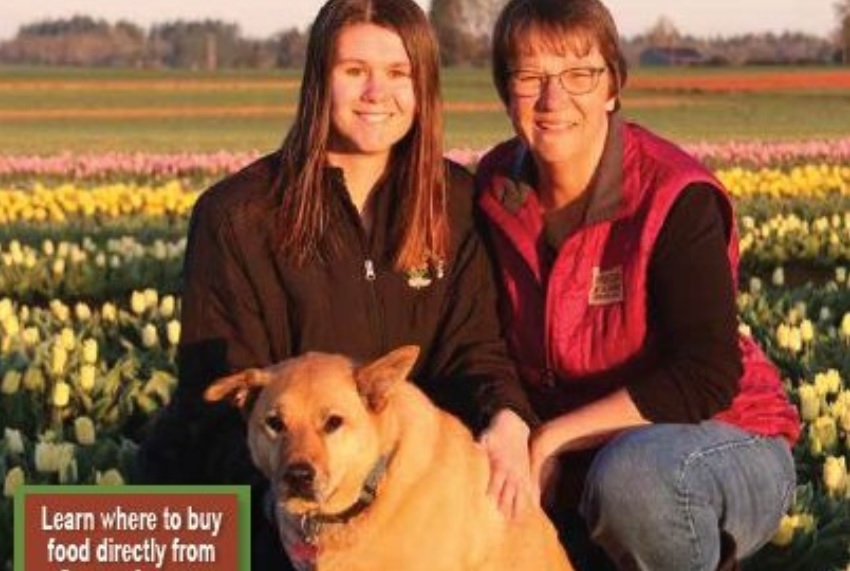When Barb Iverson was elected as Oregon Farm Bureau’s 17th president in December 2019, she would’ve never imagined that in just a few months, a global pandemic would cause her family to cancel the 36th annual Wooden Shoe Tulip Festival in Woodburn.
But like most farmers and ranchers who’re accustomed to facing challenges and adapting to survive, Iverson and her family are proudly #StillFarming.
Q: What’s your background?
BI: I grew up on our family farm near Woodburn that was established in 1950 by my parents, Ross and Dorothy Iverson.
My earliest memory is of being in charge of picking the bottom half of a pole-bean row — which was the highest I could reach!
I attended Oregon State University and graduated with a degree in horticulture. I went to work for my uncle growing rhododendrons for Van Veen Nursery, a business my grandfather started.
After 12 years of an up-and-down market, I was fortunate to join Iverson Family Farms with my brothers.
In 1983, I also helped start a small retail/mail-order business with my sister and sister-in-laws called Wooden Shoe Bulb Company. In 1985, we opened our tulip field to the public and today, the Wooden Shoe Tulip Festival attracts thousands to our farm every spring.
Besides tulips, the farm is growing a diversified combination of crops, including various grass seeds, vetch seed, filberts, table and wine grapes, and industrial hemp. We also extract CBD oil from our hemp grown on the farm.
Q: What should the public know about agriculture during these uncertain times?
BI: First, we can all be thankful that the Oregon ag community is #StillFarming and #StillRanching while most of us are stuck at home. Our food supply is strong and stable.
Farmers and ranchers are adept at overcoming adversity. From the challenges with the weather or pests, to labor shortages, to constantly increasing regulations, to economic hardships, we must adapt quickly to survive.
I see the farming and ranching community doing the same with this coronavirus crisis. We’re putting our heads down and working through it to keep food on the tables, beauty in people’s yards, feed for animals, cover crops for the environment.
I’m looking forward to coming out the other side with the hope that the public has more awareness and appreciation of the great job farmers and ranchers do every day to keep the food supply chain stable and keep food on the shelves, along with providing countless other ag products.
Farmers and ranchers can make growing crops and raising animals look easy. Our food supply is abundant, safe, and of the highest quality. Until a crisis hits, the public can sometimes forget how essential agriculture is to their daily lives.
Q: What inspired you to run for OFB president?
BI: The people in Farm Bureau are like family. We speak the same language and understand each other, which is rare outside of the farming and ranching community. I realized with my long and diverse farming career, as well as my 30 years of involvement in the organization, this was a challenge I wanted to take on.
Q: What’s one of your goals as OFB president?
BI: The perception of what we do in agriculture isn’t matching up with reality. We need to tell our stories with lawmakers and the public more effectively. My ultimate goal is healthy rural communities. And to get there, we need healthy farms and ranches where the people who are immersed in the day-to-day care of their land can thrive.
Q: Why do you believe so strongly in Farm Bureau?
BI: I trust in those who live and work on the land of this great state: our farmers and ranchers. Their vision of sustainability is in generations, both previous and future. As a grassroots organization, Farm Bureau gives us a united voice and an effective means to advocate for agriculture and our livelihoods.
.
.
Adapting through adversity
“It comes with deep sorrow that our 2020 Wooden Shoe Tulip Festival will be cancelled.”
This message was posted on the Wooden Shoe’s Facebook page on March 21. It was an unprecedented decision made by the Iverson family over concerns about the novel coronavirus and the safety of their visitors and employees.
“This would’ve been our 36th year of doing the festival,” said OFB President Barb Iverson, who works alongside many family members on the multigenerational farm in Clackamas County.
Since 1985, the Wooden Shoe Tulip Farm has opened its fields of gorgeous, multicolored tulips to thousands of people from around the world, creating not only unforgettable memories for visitors — but an important revenue stream for the family farm.
While most farmers and ranchers have been able to continue working during the COVID-19 outbreak and keep America’s food supply stable, others with agritourism ventures have had to shut their doors.
“But farmers and ranchers are really a resilient group of people as a whole. We’re used to dealing with challenges and figuring things out,” said Iverson.
Indeed, within three days of canceling the 2020 festival, Wooden Shoe had alternatives in the works. Customers could visit WoodenShoe.com and purchase pots of tulips or daffodils to be delivered to an assisted living center, brightening the day of quarantined seniors. Festival membership packages for the 2021 tulip season were also available for purchase.
And a nearby flower farm, Swan Island Dahlias, offered to sell Wooden Shoe pots of tulips and daffodils at its self-serve farm stand.
“They’ve taken close to 600 pots from us already and just told us they need 100 more,” said Iverson.
“The local community has been incredibly supportive of our farm.
